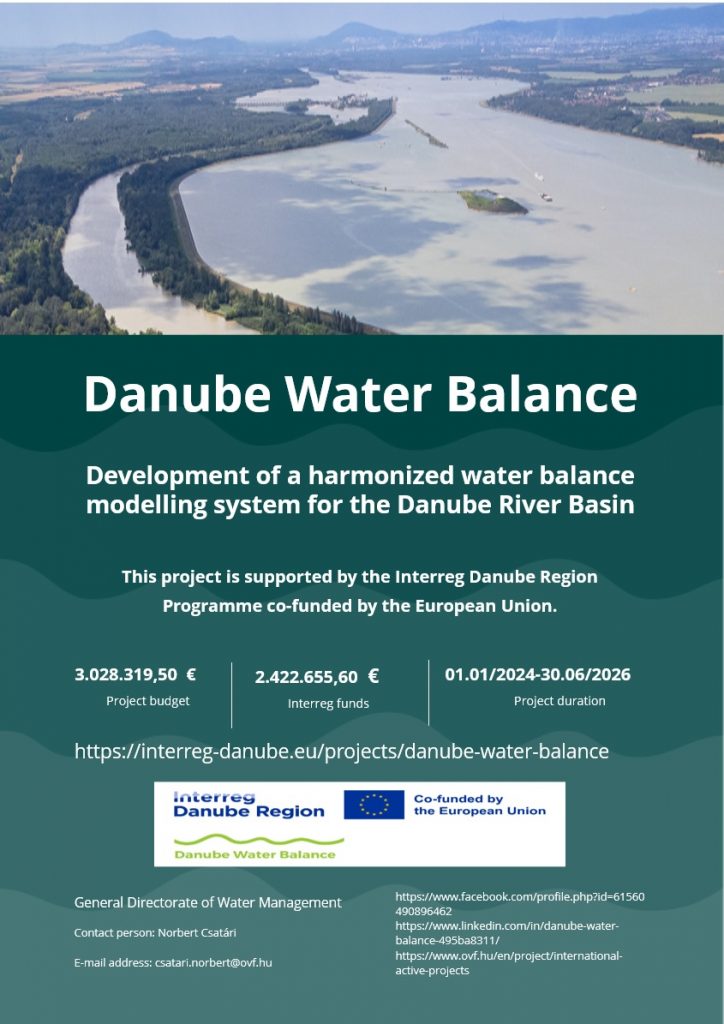
Development of a harmonized water balance modelling system for the Danube River Basin
Project acronym: Danube Water Balance
Investor: Danube Region Programme
Project duration in months: 30
Project started: 01.01.2024.
The extreme and trend like climate change impacts cause significant water balance issues in the Danube River Basin (DRB), already posing major challenges also for the environment, the economy and the whole society. Water management in the DRB is characterized by scattered data availability and various national calculation methods, ultimately leading to country-scale or sub-regional mosaics about the water balance. A jointly developed data management and a water balance model are needed to cope with the transnational water quantity challenges of the basin. The Danube Water Balance project aims to overcome this situation and contribute to sustainable, integrated transnational water management in the DRB.
The overall objective of the project is to develop a harmonized water balance modelling system in the DRB.
Main project outputs will cover four fields:
- Improved data management for present and future water balance calculations. This will consist of:
-
-
- a data repository for all input and output data of the model,
- a set of tools supporting input data collection, validation, conversion and result visualization and interpretation and
- a new data management strategy providing a sound basis for data related activities of future water balance and water management modelling. Both the data repository and the tools will be open access, therefore the list of beneficiaries extends from water experts using the developed model through experts from other water related fields to decision makers willing to understand the main characteristics of the DRB as a hydrological system.
-
- The state-of-the-art, open-source water balance model for the DRB, that allows the quantification of water balance components for the entire basin and for selected areas of interest. The model will be calibrated and validated against measured data collected and processed by jointly defined data management protocols, assuring the common acceptance of model results. The foreseen afterlife of the water balance model is a fully functional water management model of the basin, by which a more reasonable, sustainable and adaptive water management can be achieved in the long run.
- Elaborated water balance scenarios for 4 selected transboundary sub-basins, namely Morava (CZ, SK & AT), Tisa (HU, SK, RO, RS & UA), Upper Sava (SI & HR), and Drina (RS & BA). This key action within the project will be the cornerstone of future cooperation by providing a good exercise for our international experts to test and enhance the Danube River Basin Water Balance model (DRBWBM) and the founded common data repository.
- Improved stakeholder insight into transboundary water balance methodology: strong emphasis will be put on sectoral stakeholder involvement and capacity building in the project. Besides the essential technical modelling steps, it is planned that several trainings will be carried out and an expert hub will be established that will consist of modelling experts, water managers, and other professionals from water-related sectors. This approach will ensure that water experts, universities and all interested stakeholders will benefit from the project results and their ability to carry out transnational projects on transboundary water issues is greatly enhanced.
This project will be implemented through a partnership designed to ensure that organizations cover all relevant aspects of water management. The current project partnership covers 14 countries of the Danube River Protection Convention and includes 20 project partners from 11 countries and 13 associated strategic partners from 9 countries. The leading partner is OVF - General Directorate for Water Management of Hungary. The project will seek active involvement of the ASPs to help validate and disseminate of the project results. With the involvement of ICPDR as an ASP, the level of joint implementation rose even higher.
As a Project Partner representing Republika Srpska in Bosnia&Herzegovina, Institute for Water Management will provide essential data for the development of the common water balance model and for the climate change impact analysis for the territory of Republika Srpska.
Also, the Institute will act as an operational body in the DRB, supporting the development of pilot water balance modelling actions in the Drina river basin, especially for solving transboundary water balance issues.


